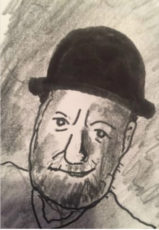 Jack Foley’s essay on Lawrence Ferlinghetti, “The Splendid Life of the World,” appeared in both Poetry Flash and in Jack’s book, O Powerful Western Star.
Jack Foley’s essay on Lawrence Ferlinghetti, “The Splendid Life of the World,” appeared in both Poetry Flash and in Jack’s book, O Powerful Western Star.
On today’s show, continuing his celebration of Lawrence Ferlinghetti, Jack will read the concluding portions of the essay. The essay ends,
Ferlinghetti emphasizes the personal nature of These Are My Rivers by leaving out two of his most notorious political pieces, “Tentative Description of a Dinner To Promote The Impeachment of President Eisenhower” and “One Thousand Fearful Words For Fidel Castro.” Political concerns remain, however: it would not be a Ferlinghetti book without them. The poet’s lifelong interest in “anarchism” probably has personal resonances as well: it is still another way of affirming being Italian. In a sense, Ferlinghetti has spent much of his life in a fierce battle with his patrician upbringing. “I am looking for my Old Man / whom I never knew,” he writes in “Autobiography.” But his father was of a class quite different from the one in which the poet himself grew up. Ferlinghetti’s politics and his interest in “populism”—while certainly genuine in and of themselves—are connected, I think, to his longing for his lost father. That is one of the reasons why he has learned Italian: to feel the presence of that “gone” person.
Though he ranges widely, there are of course kinds of poetry which Lawrence Ferlinghetti does not write. Lines like these from Paul Celan, with their extraordinarily “private,” puzzling intensity, deliberately pushing into areas of the mind where there is nothing but mystery, cannot be found in Ferlinghetti’s work:
Stumme Herbstgerüche. Die
Sternblume, ungeknickt, ging
zwischen Heimat und Abgrund durch
dein Gedächtnis.
Eine fremde Verlorenheit war
gestalthaft zugegen, du hättest
beinah
gelebt.
Dumb [i.e., mute, silent] Autumn smells [odors]. The
marguerite [in German, “starflower”], unbroken, passed
between home and chasm through
your memory.
A strange lostness was
palpably present, almost
you would
have lived.
(Poems of Paul Celan, translated by Michael Hamburger)
Ferlinghetti remains, in his own phrase, a poet of “the splendid life of the world” (“Endless Life”)—a life which is always vanishing. The questions his work raises, however, are by no means trivial ones.
Is poetry like painting, a visual art? Is it like music, an oral/aural art? Is the poet a public figure, and, if so, what kind of a public figure? How is it possible to create a space for art in a country where art is notoriously devalued (“In two hundred years of freedom / we have invented / the permanent alienation of the subjective / almost every truly creative being / alienated & expatriated / in his own country”—“Adieu à Charlot”)? What is the relationship between books and “the media”? How does one create an audience for poetry? What is the relationship of our ethnic identities to our “American” selves? (Immigration is a mode of “passage” and colors that theme in Ferlinghetti.) These are not dead issues but living perplexities, questions which any conscious poet continues to ask at this moment. Ferlinghetti’s work helps to create a powerful “space” in which some kind of clarification of these issues may be possible. At a recent exhibition of his paintings, he remarked, “I hope nobody gets the idea that just because it’s more institutional…that I don’t have some subversive intent, or that Eros is at rest.” To be sure, his vision is of a kind we call “Romantic.” But, as Robert Creeley suggests in Echoes, the problems the Romantics posited are still with us—we are all “Romantics”: “whatsover [is] ‘Rome’ [is] home.” These Are My Rivers is a fine exploration of the condition of America 1955-1993.
PART TWO OF TWO
My drawing has a caption from Lawrence Ferlinghetti’s work: “Chaplin is dead but I’d wear his bowler.”

